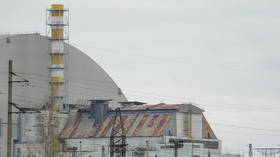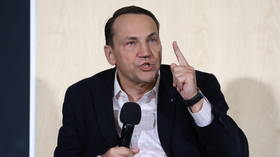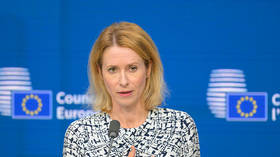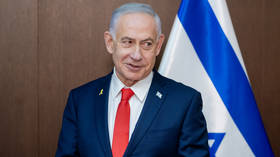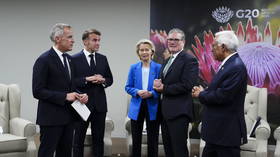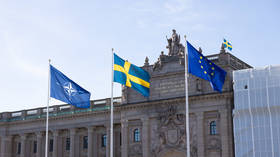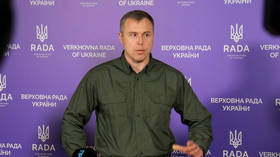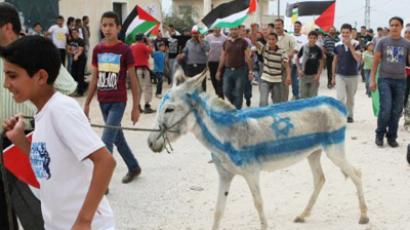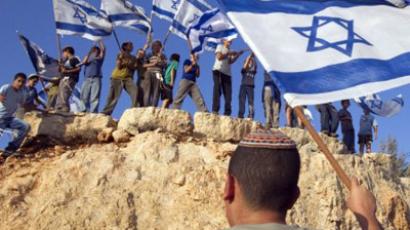Bombed for nothing: Everyday life on Israeli-Gaza border
Despite all calls for peaceful negotiations, rockets and violence are part of life on the Israeli-Gaza border. As civilians bear the brunt of the conflict, Faisal Malaka from Gaza told RT’s Nadezhda Kevorkova how it feels to live there.
"Why do you always come after the war and destruction? Why don’t you want to stop them, before they start?" says local farmer Faisal Malaka, aged 22. He is reluctant to talk because he doesn’t think “they” do much good.By ‘them’ he means the Israeli army officers, who are just a few hundred meters away. The border is demarcated with an electric fence and towers. Faisal says the fence is lethal. His house is closest to the border."Europeans have been writing about us in their newspapers since 1948. But nothing is changing. You are the fourth or the seventh to have come here since the war of 2008. Journalists can’t stop them,” Faisal tells the children to go inside the house and not to look out of the windows. He allows me, though, to take some pictures of the dents on the house walls and the steel shutters on the windows that are meant to protect his family. We had seen the dents and shutters from a distance. But children will be children: they sit in a corner for a while, then come and hang around the adults again. Faisal is a manager. A graduate of Gaza’s Islamic University, he has a Master’s degree with honors."The Israelis say, you are illiterate and ignorant peasants and you don’t know how to read or write.""We are the most educated people in the Middle East. The more they take from us, the more we learn. Before, I could work in the garden. The only thing I can do now is to learn. There’s nothing funny about it,” Faisal says in response to my forced smile.His family used to have orchards, but not anymore."Since 2000, Israeli bulldozers have destroyed all the trees here. They’ve cut down all the orange, lemon, almond and olive trees. They’ve destroyed our hen-house. They buried our house in sand twice – in 2000 and 2009. On the 22nd of January, they came and buried our house in snow up to the roof?” Faisal tells me twice about the bulldozer as my mind refuses to take it all in.Faisal’s uncle, Mohammed Malaka comes out to talk to us. He is 58, and he has a Bachelor’s degree from Cairo University. He speaks English, and he is convinced that the locals should speak to media people. He patiently responds to all of my questions, as I ask him to comment on the allegations made by Israeli hardliners: namely that the Palestinians are an alien tribe here, that they are in fact Gypsies, that they look forward to selling off their land to Israel, and that they miss the time when there were Israeli settlements in Gaza.
"Our families have always lived here – hundreds of generations. Now, Sharon’s family is living on my land. Do you know where this Sharon has come from? He’s from Russia. So, I cannot understand why he, a newcomer, has settled on my land? I didn’t tell him to come and live here. It’s true that we’ve moved. One hundred years ago our house stood closer to the road. Now, we’ve moved a hundred meters away from the road. When they were setting up a border here, they cut off thousands of meters of our land. They offered no compensation to anybody. In fact, we don’t need their compensation. We won’t take it even if they offer us millions. They start firing without warning at a distance of 500 meters to the wire. They shoot to kill, whether it’s a goat or a child.” Mohammed tells his household to fetch chairs for all of the guests. His children and grandchildren offer us fresh water and coffee. The men in the family light their cigarettes.I tell them that the Israeli army is defending its nation from Qassam rockets that are used to shell their territory."It’s only them who fire! No one has ever fired a single shot from our side! Look, militant groups never fire from residential areas! Farmers don’t have weapons, and they know that. Militant Palestinian groups understand that the Israelis fire rockets in response. The militant groups don’t want ordinary people to suffer because of them. But Israeli soldiers used me as a live shield. An Israeli soldier grabbed me this way and pushed me in front of himself as he was walking towards my house.” Mohammed shows how an Israeli officer grabbed him by the neck. Unlike the youth, he laughs at the enemy. Everyone else starts laughing, too.
Mohammed himself has lost count of his grandchildren: "37 or 40?It was 37 a month ago. Our family has several houses. It’s hard to look after all of them. We give birth to children because they kill us and we put up resistance. All our children go to school. The school is nearby. It was destroyed by bombs during the war. My car was also destroyed by bombs.” We exchange phone numbers. Mohammed asks: "So what? Shall I call you when they start bombing us again? Will you come here to defend us so that Faisal can see someone come BEFORE bombs start falling?” Mohammed seems happy with finding a way to turn it into a good laugh. And I proceed to tell him how difficult it is for a reporter to get a permit to work in Gaza. On hearing that we had to wait three months for the permit, Mohammed casts a long look at the fence and towers, and says: "I think you’d better stay here, to make sure you’re ready by the time they start shooting.”
Nadezhda Kevorkova, RT


